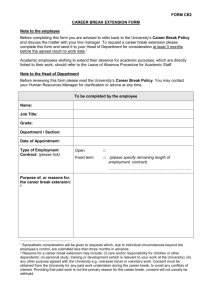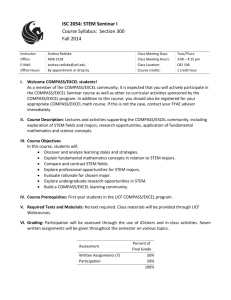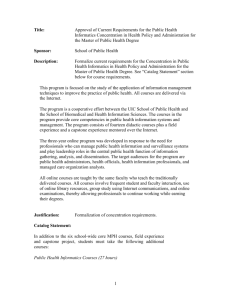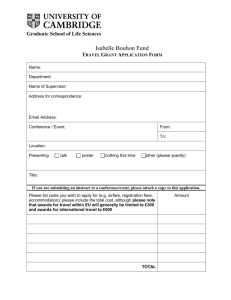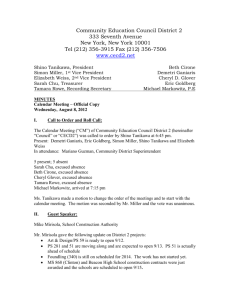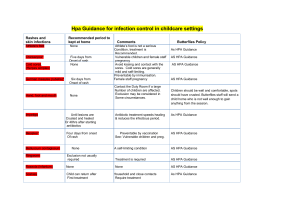Spring 2015 STEM Seminar II - The EXCEL Program
advertisement
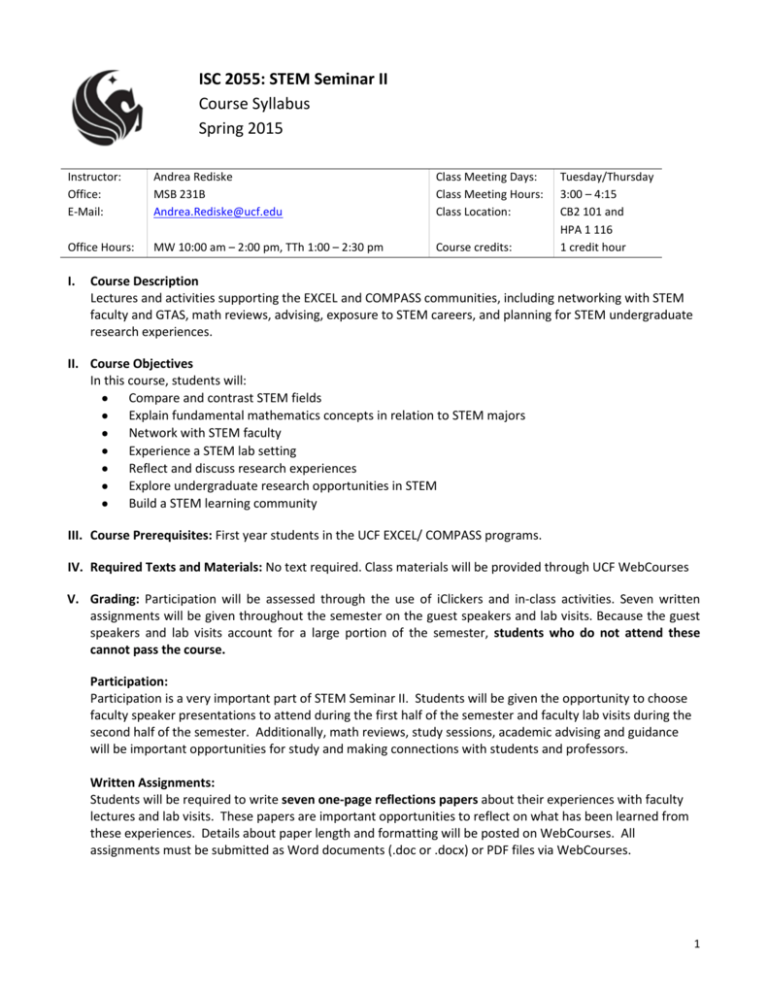
ISC 2055: STEM Seminar II Course Syllabus Spring 2015 Instructor: Office: E-Mail: Andrea Rediske MSB 231B Andrea.Rediske@ucf.edu Class Meeting Days: Class Meeting Hours: Class Location: Office Hours: MW 10:00 am – 2:00 pm, TTh 1:00 – 2:30 pm Course credits: I. Tuesday/Thursday 3:00 – 4:15 CB2 101 and HPA 1 116 1 credit hour Course Description Lectures and activities supporting the EXCEL and COMPASS communities, including networking with STEM faculty and GTAS, math reviews, advising, exposure to STEM careers, and planning for STEM undergraduate research experiences. II. Course Objectives In this course, students will: • Compare and contrast STEM fields • Explain fundamental mathematics concepts in relation to STEM majors • Network with STEM faculty • Experience a STEM lab setting • Reflect and discuss research experiences • Explore undergraduate research opportunities in STEM • Build a STEM learning community III. Course Prerequisites: First year students in the UCF EXCEL/ COMPASS programs. IV. Required Texts and Materials: No text required. Class materials will be provided through UCF WebCourses V. Grading: Participation will be assessed through the use of iClickers and in-class activities. Seven written assignments will be given throughout the semester on the guest speakers and lab visits. Because the guest speakers and lab visits account for a large portion of the semester, students who do not attend these cannot pass the course. Participation: Participation is a very important part of STEM Seminar II. Students will be given the opportunity to choose faculty speaker presentations to attend during the first half of the semester and faculty lab visits during the second half of the semester. Additionally, math reviews, study sessions, academic advising and guidance will be important opportunities for study and making connections with students and professors. Written Assignments: Students will be required to write seven one-page reflections papers about their experiences with faculty lectures and lab visits. These papers are important opportunities to reflect on what has been learned from these experiences. Details about paper length and formatting will be posted on WebCourses. All assignments must be submitted as Word documents (.doc or .docx) or PDF files via WebCourses. 1 Faculty Speakers: Students will be required to attend four scheduled faculty speaker presentations during weeks 2 – 5. In order to receive credit for participation, students must attend at least one faculty speaker presentation per week, and attendance at only one class is required during that week. Please note: during some weeks, some students will be required to attend both class sessions due to a scheduled math review. For example, in week 2, Calculus II students will need to attend a faculty speaker on 1/20 as well as the Calculus 2 math review on 1/22. Lab Visits: Students will be required to attend three scheduled lab visits with different faculty during weeks 10 – 12. Guidelines and further instructions for lab visit sign-ups and directions to labs will be posted on WebCourses. Other Assignments: Two other assignments will be included in the grades for STEM Seminar II: • Syllabus Quiz: This is a quiz that will be taken on WebCourses by all students that reviews course policies. It will be due by Friday, January 16th and will be worth 25 points. • End-of-Course Evaluation: This is an opportunity for students to give feedback on STEM Seminar II. The end-of-course evaluation will be worth 25 points. Further details will be given via WebCourses as we near the end of the semester. Assessment: Written assignments and other assignments Attendance and participation Percent of Final Grade: 50% 50% Grades for this course are assigned as Satisfactory (S) or Unsatisfactory (U). Grading Scale % 70 – 100% <70% Grade S U VI. Grade Dissemination: Graded materials in this course will be returned individually only by request. You can access your scores at any time using the Grade Book function of Webcourses. Please note that scores returned mid-semester are unofficial grades. Students are expected to check their grades often. Participation grades, such as iClicker questions, will be posted weekly. Students have two weeks from the date of the posting to dispute these grades. VII. Course Policies: Grades Late Work Policy: There are no make-ups for in-class activities. Written assignments turned in late will be assessed a penalty: 10-point deduction if it is one day late, and 20-point deduction if it is two days late. Assignments will not be accepted if overdue by more than two days and will receive a zero grade. Attendance Policy: If an emergency arises and you must miss a class meeting, or if you feel there was an error with your attendance recording through iClicker you must contact the professor within two weeks of the missed class or iClicker error in order for adjustments to be made. VIII. Course Policies: Technology and Media Webcourses: All course communication will be through Webcourses. Emails to the instructor or GTAs should be through Webcourses and will be responded to within 48 hours, M-F. Grades for each in-class activity and 2 writing assignment will be released in Webcourses, along with the final grades. Class materials such as PowerPoints, assignments, grading rubrics, etc. will be posted here. Students are expected to log in at least once a week to check for class announcements and other information. Classroom Response Clickers: We will be using iClickers in class on a regular basis. You will need to purchase an iClicker pad (commonly called a “clicker”) from the bookstore or computer store and bring it with you to every class session. It would be wise to bring extra batteries as well, as we will be using the pads in activities that count for class points. The purchase of a clicker is NOT optional; it will be used as an integral part of this course. I will provide a short demonstration of how to use it in class. Note: the clicker can be used in other classes if it is the same version/generation. Check with your other instructors to be sure. After you purchase your clicker, you must register your iClicker via Webcourses for this class. It is imperative that every student registers their unit no later than the first week of class. Instructions for the registration process can be found on the handout. Note: This course requires an iClicker+ but an iClicker2 will also work. So, if you have a class that requires an iClicker2, it can be used for both classes. Technology and Media Devices: Personal technology such as mobile phones and laptops should not be used during class. These devices not only detract from the seminar presentations, but use of devices during presentations is disrespectful to the presenter, whether it is the professor or faculty guest lecturers. Students will be warned to put these devices away, but repeat offenders can be asked to leave and will forfeit the participation points for that class. VIII. Course Policies: Student Expectations Disability Access: The University of Central Florida is committed to providing reasonable accommodations for all persons with disabilities. This syllabus is available in alternate formats upon request. Students who need accommodations must be registered with Student Disability Services, Ferrell Commons Room 185, phone (407) 823-2371, TTY/TDD only phone (407) 823-2116, before requesting accommodations from the professor. Attendance Policy: Participation counts for one half of the total course grade, therefore, it is imperative that students attend class. Students with an excused absence should contact the instructor within two weeks of the missed class. Professionalism Policy: Please arrive on time for all class meetings. Students who habitually disturb the class by talking, arriving late, etc., and have been warned may suffer a reduction in their final class grade. Students are expected to behave in a professional manner when attending faculty presentations and lab visits. Academic Honesty: When selecting iClicker answers to in-class questions, it is expected that you are doing the work on your own. Students possessing more than iClicker in class will be given a failing grade for the course. Academic dishonesty is strictly forbidden and disciplinary action in accordance with University policy will be taken in response to such behavior. For more information, please visit http://www.ucf.edu/goldenrule. IX. Important Dates Withdrawal deadline: Spring Break: March 24, 2015 March 9, 2015 – March 14, 2015 3 Course Schedule and Assignment Deadlines Week Dates 1 2 1/13 1/15 1/20 1/22 1/27 3 1/29 2/3 4 2/5 2/10 5 2/12 6 7 8 9 10 2/17 2/19 2/24 2/26 3/3 3/5 3/10 3/12 3/17 3/19 Topic Introduction, Getting Ready, and Lessons Learned: CB2 101 Study Session, CECS: CB2 101; COS/COM: HPA 116 Faculty Guest Speakers Industrial Engineering: Dr. Pazour, CB2 101 Chemistry: Dr. Yestrebsky HPA 116 Study Session, CECS: CB2 101; COS/COM: HPA 116 Faculty Guest Speakers Computer Science: Dr. Laviola, CB2 101 Biology: Dr. Mansfield, HPA 116 Faculty Guest Speakers: Physics: Dr. Brisset, HPA 116 Math Review: Pre Calculus: CB2 101 Faculty Guest Speakers Civil & Environmental Engineering: Dr. Medeiros, CB2 101 Biology: Dr. Jenkins, HPA 116 Faculty Guest Speakers Civil Engineering: Dr. Zaurin, CB2 101 Math Review: Calc I: HPA 116, Calc II: TBA, Calc III: TBA Faculty Guest Speakers Mechanical Engineering: Dr. Kassab, CB2 101 Forensic Science: Dr. Ballantyne, HPA 116 Faculty Guest Speakers Computer Science & Engineering: Dr. Sukthankar, CB2 101 Biomedical Science: Dr. Self, HPA 116 CTI Review/Discussion: CB2 101 Study Session, CECS: CB2 101; COM/COS: HPA 116 Math Review: Pre Calculus: CB2 101 Math Review: Calc 2: CB2 101, Calc 3: HPA 116 Academic Advising and Guidance – CECS Academic Advising and Guidance – COS/COM Information Reflection Paper #1 due 1/27 at 3:00 pm Reflection Paper #2 due 2/3 at 3:00 pm Reflection Paper #3 due 2/10 at 3:00 pm Reflection Paper #4 due 2/17 at 3:00 pm No Class: Spring Break Experiential Learning Lab Visits Math Review: Pre Calculus: CB2 101, Calc 1: HPA 116 Experiential Learning Lab Visits Reflection Paper #5 due 3/24 at 3:00 pm 4 Week Dates 3/24 11 12 13 14 15 16 3/26 3/31 4/2 4/7 4/9 4/14 4/16 4/21 4/23 4/28 4/30 Topic Experiential Learning Lab Visits Experiential Learning Lab Visits Math Review: Calc 2: CB2 101; Calc 3: HPA 116 Experiential Learning Lab Visits Experiential Learning Lab Visits Study Session, CECS: CB2 101; COS/COM: HPA 116 Research Seminar: CB2 101 All students Math Review: Pre-Calc: CB2 101, Calc 1: HPA 116 Math Review: Calc 2: CB2 101; Calc 3: HPA 116 Reflections, Evaluation, Final Exam Review: CB2 101 Study Session, CECS: CB2 101; COS/COM: HPA 116 Information Reflection Paper #6 due 3/31 at 3:00 pm Reflection Paper #7 due 4/7 at 3:00 pm Final Exam Period This schedule is subject to revision by the instructor. Students are expected to check Canvas at least once a week for course information and updates. 5
